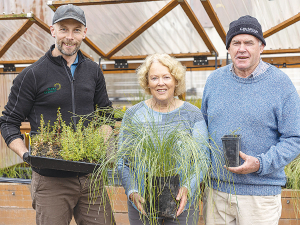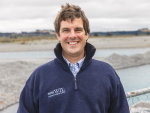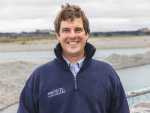A nursery initiative to empower Waimakariri Irrigation Limited (WIL) shareholders to grow their own native seedlings has proven successful.
More than 2000 plants have been grown during the last two years at Brian and Rosemary Whyte’s Swannanoa farm. It is part of a wider biodiversity project that aims to improve waterways throughout the irrigation cooperative’s scheme with 297 sites of interest discovered during an initial biodiversity survey in 2018. Key areas for restoration efforts include the Burgess Stream, Hunter’s Stream, and the Cust River.
The native seedlings have been planted along the first stretch of a 1.2-kilometre section of Burgess Stream, which flows through Whyte’s property and around a nearby irrigation buffer pond.
WIL’s biodiversity project lead Dan Cameron says the site is an important part of the project due to its location near the springhead of the Burgess Stream.
“The restoration site is connected to the upper source of the Burgess Stream with four springheads converging to form the stream and once it gets to Brian and Rosemary’s property it forms the main stem, and not far beyond here it leaves the boundary of the shareholder land.”
The section of the stream chosen for the project has certain properties which make it ideal as an environmental restoration site, Cameron explains.
“It’s relatively undisturbed, has a deep and wide well-defined riparian margin and stock have been excluded. There’s relatively moist soil near the water’s edge and meandering areas which lend themselves to establishing the types of plant communities that would have been here before land use development.”
plants improve water quality by shading the stream and in some cases even assist with the removal of nitrates from water in a way that complements on farm nutrient management.
“Carex secta colonises denitrifying bacteria in its roots which helps to naturally denitrify water and prevent sediment build up.”
Back in 2019, when the first shareholder meeting was held at a neighbouring farm, the Whytes weren’t sure what the biodiversity project would involve but were happy for Cameron to visit their property and haven’t looked back since then. Brian Whyte was particularly interested in attempting to propagate native broom, which grows along the roadside of their property, and planting it along the banks of their restoration site.
“When Dan first visited, I showed him the native broom that was growing along the road. Getting seed off it and managing to grow some in our greenhouse has been quite thrilling for me.”
Cameron says being able to reverse the decline of indigenous biodiversity and witnessing the broom naturally regenerate at the planting site has been one of the highlights of working with the Whytes.
“Being able to harvest seeds from the native broom and growing what would have been naturally growing in the area before land use development is something quite rare. What is even more exciting is seeing broom naturally pop up at the planting site.”
A Wide Range of Plants Grown
The Whytes have enjoyed growing a range of native seedlings suitable for the conditions at their planting site.
The only part of the process which has been a bit tedious is the pricking out of individual seedlings, but Rosemary Whyte says having Cameron and Swannanoa School to help has made the process easier.
“When you have 500 seedlings to plant out it takes a while which is why we were so grateful to have help from Swannanoa School, Dan, and a church youth group. Giving younger people a chance to get their hands in the dirt and plant something is important.”
With most of the planting around the wet margins of the stream edge completed, the focus is now on the sections further up the banks and different seedlings are being grown for this area as the bank is exposed to hot dry winds and is composed of free draining soils.
The Whytes would encourage other farmers to get involved in biodiversity initiatives and views it as having intergenerational benefits.



















